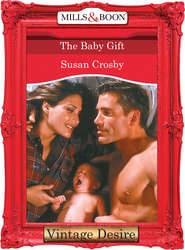По всем вопросам обращайтесь на: info@litportal.ru
(©) 2003-2025.
✖
The Doctor's Pregnant Bride? / The Texas Billionaire's Baby: The Doctor's Pregnant Bride? / Baby By Surprise
Автор
Год написания книги
2019
Настройки чтения
Размер шрифта
Высота строк
Поля
“I’d like to hear your take on it.”
He got distracted by her sneakers, which she propped on the bottom rung, their scuffed toes at odds with her usually impeccable appearance. “You graduated from BC?” he asked, glancing at her T-shirt imprinted with the Boston College’s flying eagle mascot, Baldwin.
She frowned at the change of subject. “From the Connell School of Nursing, yes. The institute gave me a full scholarship.”
“I would venture to say you earned a full scholarship.”
She seemed to relax for the first time since she’d walked into the lab. “I always loved to study.”
“Me, too. I still do.”
She gave him a knowing smile, as if he’d stated the obvious, which he supposed he had. He much preferred the confines of his lab to dealing with patients on a daily basis. He hated imparting bad news. And in the infertility business, bad news came frequently. He was happier in the lab.
“So, you were going to tell me about what you found,” Sara Beth prompted.
“Shortly after Chance and I came on board here, we discovered that some of the lab’s protocols weren’t measuring up. Data was incomplete or missing. Statistics weren’t matching results. Just as we were digging into the problems, Keeping Up with Medicine ran that story alleging that donor eggs and sperm had been switched for some clients, which raised all sorts of ethical questions about how we do business.”
“The article never named the source of the allegations.”
“Nor confirmed them. Then they were proved unfounded and a retraction was made. But at the same time that we were working on that issue, we discovered an out-of-the-ordinary number of multiple births following in vitro over the past few years.”
“Which means what?”
“Numbers that big could pad the institute’s statistics, making the program seem more successful than it is. We have standards about how many embryos to implant. It looks like the standards might have been ignored. Because of the unusual success rate, the institute was able to obtain a lot more private donations and grant money than usual. Now the numbers are being challenged, and rightfully so.”
What he wasn’t telling her was that every step he’d taken to resolve the problems had been met with resistance by Derek Armstrong, Paul and Lisa’s brother and the institute’s CFO. Chance was the only person Ted had confided in about that—so far. He couldn’t make accusations without proof, but Ted suspected Derek was involved somehow, whether as part of a cover-up or something even worse.
“So, first of all,” Ted continued, “we need to prove or disprove the statistics. Then we need to create a best-practices manual of lab protocols, so if we’re ever questioned again, the answers will be readily available and backed up. I can use all the help I can get. The institute’s reputation is on the line, but so is my ability to continue my research.”
She rubbed her hands together, as if anxious to get started right away. “I’ll check the appointment schedule for the rest of the week and see what I can do to rearrange things and free myself up. Would you prefer morning or afternoon?”
“First thing in the morning.”
She climbed off the chair and stuck out her hand. “Then I’ll see you tomorrow.”
He stayed seated, keeping himself closer to eye level. Her hand felt small in his, and warm, but also firm and direct. One of the traits he valued most in people was competency. She hadn’t been promoted to head nurse without proving her competency. “I’m looking forward to working with you, Sara Beth.”
“Thank you. I feel the same.”
He believed it. Her expression showed anticipation, as if she really couldn’t wait to get started. He’d tried to get across to her how tedious the work would be, especially if she had to work with the old files in the vault, poring over the folders. Well, she’d find out soon enough.
“Have a nice evening,” he said.
“You, too.” She headed toward the door, then turned around, walking backward. “Happy Valentine’s Day.”
Valentine’s—Damn. “Oh, uh, same to you,” he said, but the door had already closed behind her.
Damn. Once again he’d screwed up. He glanced at his watch. He’d intended to leave more than an hour ago to buy a gift. Aside from the traditional, uncreative grocery-store offerings, what could he buy? When he’d lived in San Francisco he’d gotten away with having something sent, but Boston was home. He didn’t have that excuse anymore. He needed to take a personal gift this time, something thoughtful.
From the lab window he spotted Lisa outside standing next to Sara Beth, hugging her helmet and laughing, looking much more carefree than the Sara Beth who’d just left his lab.
He went still. Thoughts swirled. A plan formed. She might be of some help.…
Ted locked his computer, tossed his lab coat toward a hook, then raced out of the building as Lisa drove off. He encountered Sara Beth as she was buckling her helmet. Her face registered surprise—and a little wariness—as he descended on her.
“I know we barely know each other,” he said. “But hear me out, please.”
“Okay.” The word came out slowly, curiously.
“This is the first time I’ve been home for Valentine’s Day since I graduated from high school.”
“Boston is home?”
He just nodded. “I’m supposed to be at my parents’ house in forty-five minutes for dinner. I need to take a gift.”
“I’m sure you’ll be able to find roses at almost any market.”
“And my mother would say ‘how lovely’ and that would be that. I want to do better than that. I want you to be my parents’ gift.”
Her big brown eyes opened wide. “Excuse me?”
He was pretty sure if she hadn’t been straddling her bike, she would’ve taken a few steps back, deciding he was a mad scientist.
“If they think I’m dating someone, it’ll make them happier than anything I could buy.” He stopped short of begging, but appealed to the female tendency to nurture. “I know I’m asking an enormous favor. I know there’s no reason for you to say yes. You may—you probably do have a date already.”
Of course she would have plans, an attractive woman like her. He felt ridiculous now for asking.
“There’s not enough time,” she said finally, gesturing to her bike. “I would have to ride home and get myself ready.”
“We’re not formal. I’m wearing what I have on, just adding a sport coat.”
She gave him a skeptical look.
He nodded toward his car. “I’ve got a bike rack.”
Fifteen minutes later he pulled up in front of her beautiful old Victorian house, said he’d find a place to park, then come back with her bike, giving her no more time to answer than he had in the parking lot, not allowing her any opportunity to say no.
He understood now the expression about someone having a deer-in-the-headlights look. She mumbled something about how to get to her second-floor apartment, then headed toward the house.
He got lucky, coming across a car leaving just a block away. He hauled her bike to her place, where the front door was ajar. He climbed the stairs inside to her unit, where her door hung open.
“Where do you want this?” he asked, rolling her bike inside.
She pointed to an empty spot in the living room. “I’ll hurry.”
She rushed into a room down the hallway, shutting the door behind her.
Ted glanced around her living room. The house was probably built around the turn of the twentieth century, but had been remodeled recently, although still using original-looking hardwood floors, and an up-to-date kitchen with stainless-steel appliances. And yet the combined living room/dining area/kitchen space was also feminine. Flowers and pottery and bright colors and… comfort. Her furniture was built for sinking into, and looked inviting.











